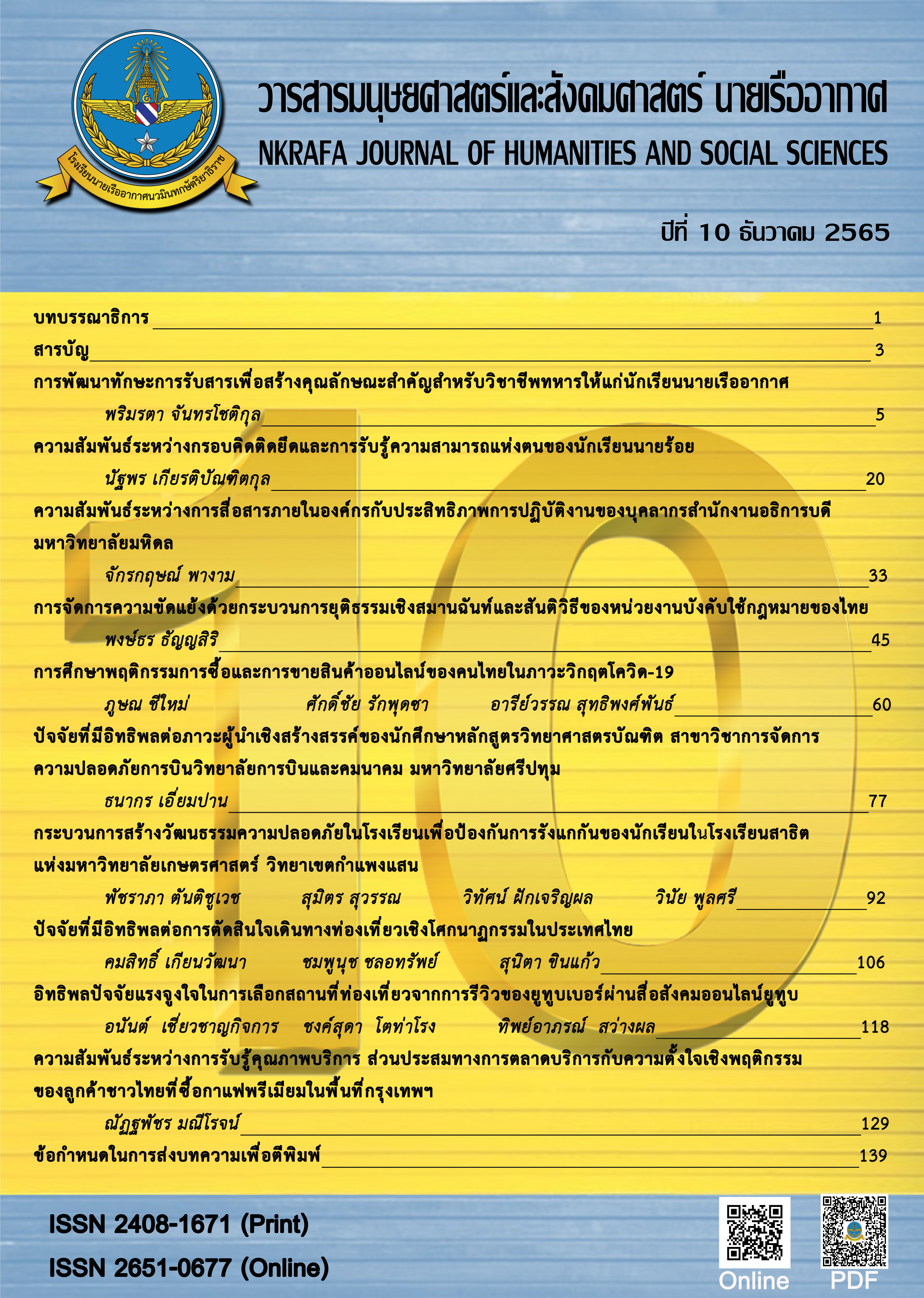ความสัมพันธ์ระหว่างกรอบคิดติดยึดและการรับรู้ความสามารถแห่งตนของนักเรียนนายร้อย
Main Article Content
Abstract
This quantitative research aimed 1) to study the levels of growth mindset and fixed mindset of the cadets, 2) to study the relationship between the mindset and self-efficacy of the cadets, and 3) to find a way to develop a growth mindset among the cadets. The research sample was 330 of 1st – 5th-year cadets, selected by multi-stage sampling. The research instruments included a questionnaire. The collected data were analyzed for frequencies, percentages, mean values, standard deviations, and Pearson’s correlation coefficients by using SPSS program.
The research results reveal that 1) the mean values of the growth mindset among samples were somewhat high. On the other hand, the mean values of the fixed mindset were average. Lastly, the mean values of self-efficacy were high; 2) the relationship between mindset and self-efficacy was statistically significant at the average level at the same direction at the value 0.01 (r = 0.468); and 3) a way to develop the growth mindset among cadets was PARA MATTER. P meant teaching procedures, A meant purposes in studying, R meant the selection of teaching methods, A meant endeavor and indomitableness to obstacles, M meant being a good example, A meant admiration for commitment, T meant instructors’ teaching methods, T meant trust-building, E meant treatment and caring for everyone equally, and R meant providing direct feedback.
Article Details

This work is licensed under a Creative Commons Attribution-NonCommercial-NoDerivatives 4.0 International License.
บทความที่ได้รับการตีพิมพ์เป็นลิขสิทธิ์ของวารสารมนุษยศาสตร์และสังคมศาสตร์ นายเรืออากาศ
ข้อความที่ปรากฎในบทความแต่ละเรื่องในวารสารวิชาการเล่มนี้ เป็นความคิดเห็นส่วนตัวของผู้เขียนแต่ละท่าน ไม่เกี่ยวข้องกับโรงเรียนนายเรืออากาศฯ และคณาจารย์ท่านอื่น ๆในโรงเรียนนายเรืออากาศฯ แต่อย่างใด ความรับผิดชอบขององค์ประกอบทั้งหมดของบทความแต่ละเรื่องเป็นของผู้เขียนแต่ละท่าน หากมีความผิดพลาดใด ๆ ผู้เขียนแต่ละท่านจะรับผิดชอบบทความของตนเองแต่เพียงผู้เดียว
References
กลัญญู เพชราภรณ์, “การศึกษาอัตมโนทัศน์หลายมิติของนักเรียนระดับมัธยมศึกษาตอนปลายในจังหวัด
สมุทรปราการ ตามแนวคิดของแบรคเคน”, วิทยานิพนธ์ครุศาสตรมหาบัณฑิต คณะครุศาสตร์
มหาวิทยาลัยราชภัฎสวนสุนันทา, 2555.
Anderson, E, Growing great employees: Turning ordinary people into extraordinary performers,
USA: Galloard, 2006.
สมัชชาการพัฒนาเด็กและเยาวชนแห่งชาติ, “เอกสารรายงานความก้าวหน้าการขับเคลื่อนสมัชชาการ
พัฒนาเด็กและเยาวชนแห่งชาติ”, 2562.
Dweck, C. S, Mindset: The new psychology of success, New York, NY: Random House, 2006.
พจนานุกรมศัพท์ศึกษาศาสตร์ร่วมสมัย ฉบับราชบัณฑิตยสภา 2561, [Online]. Available:
https://www.facebook.com/RatchabanditThai/posts/1897231787001574/ [Accessed: 28 ธันวาคม
.
Dweck, C. S, Mindset: The new psychology of success, New York, NY: Random House, 2006.
Edwards, A. R., & Beattie, R. L, “Promoting student learning and productive persistence in
developmental mathematics: Research frameworks informing the Carnegie Pathways”, NADE Digest,
(1), 30-39, 2016.
ภัทรพร กังวานพรชัย, “ความสัมพันธ์ระหว่างการควบคุมในงานและความพึงพอใจในงานโดยมีรูปแบบ
การเผชิญปัญหาเป็นตัวแปรส่งผ่านและกรอบความคิดแบบยึดติดเติบโตเป็นตัวแปรกำกับ”, วิทยานิพนธ์
มหาบัณฑิต สาขาวิชาจิตวิทยา จุฬาลงกรณ์มหาวิทยาลัย, 2559.
Blackwell, L. A., Trzesniewski, K. H., & Dweck, C. S, “Theories of intelligence and achievement across
the junior high school transition: A longitudinal study and an intervention”, Child Development. 78 (1),
-263, 2007.
King, R. B, “How you think about your intelligence influences how adjusted you are: Implicit theories
and adjustment outcomes”, Personality and Individual Differences, 53 (5), 705–709, 2012.
มุทิตา อดทน, “ผลของโปรแกรมการพัฒนากรอบความคิดเติบโตในนกัเรียนชั้นมัธยมศึกษาตอน
ปลาย”, วิทยานิพนธ์วิทยาศาสตรมหาบัณฑิต สาขาวิชาสมอง จิตใจ และการเรียนรู้ คณะศึกษาศาสตร์
มหาวิทยาลัยบูรพา, 2561.
Yamane, T, “Statistics: an introductory analysis”, New York: Harper & Row, 1973.
Likert, R, “A Technique for the Measurement of Attitudes. Archives of Psychology”, New York, 1932.
Dweck, C. S, Mindset: The new psychology of success, New York, NY: Random House, 2006.
Yeager, D. S. & Dweck, C. S, “Mindsets that promote resilience: When students believe that personal
characteristics can be developed”, Educational Psychologist, 47 (4), 302-314, 2014.
ศิริภพ โสมาภา, “การบริหารหลักสูตรฝึกอบรมเยาวชนเกี่ยวกับแนวคิดเติบโตและการเห็นคุณค่าใน
ตนเอง”, วิทยานิพนธ์ศึกษาศาสตรมหาบัณฑิต สาขาวิชาการจัดการศึกษา วิทยาลัยครุศาสตร์
มหาวิทยาลัยธุรกิจบัณฑิตย์, 2561.
Bandura, A, “Self-efficacy: The exercise of control”, New York: Freeman, 1997.
Schmidt, J. A., Shumow, L., & Cam, H. K, “Exploring teacher effects for mindset intervention
outcomes in seventh-grade science classes”, Michigan State University and Northern Illinois University, 2015.
Silver, D. & Stafford, D, “Teaching Kids to Thrive: Essential Skills for Success”, Thousand Oaks, CA:
A SAGE Company, 2017.
Marz, K. and Hertz, C, “A Mindset for Learning: Teaching the Traits of Joyful, Independent
Growth”, Portsmouth NH: Heinemann, 2015.
Gutshall, C. A, “Teachers’ mindset for students with and without disabilities”, College of
Charleston, 2013.
Silver, D. & Stafford, D, “Teaching Kids to Thrive: Essential Skills for Success”, Thousand Oaks, CA:
A SAGE Company, 2017.
มุทิตา อดทน, “ผลของโปรแกรมการพัฒนากรอบความคิดเติบโตในนกัเรียนชั้นมัธยมศึกษาตอน
ปลาย”, วิทยานิพนธ์วิทยาศาสตรมหาบัณฑิต สาขาวิชาสมอง จิตใจ และการเรียนรู้ คณะศึกษาศาสตร์
มหาวิทยาลัยบูรพา, 2561.
Hildrew, C, “Becoming Mindset School: The Powerful of Mindset to Transform Teaching, Leadership
and Learning”, New York, NY: Routledge, 2018.
Gawron, H, “Just Ask Us: Kids Speak Out on Student Engagement”, Thousand Oaks, CA: A SAGE
Company, 2018.
Silver, D. & Stafford, D, “Teaching Kids to Thrive: Essential Skills for Success”, Thousand Oaks, CA:
A SAGE Company, 2017.


